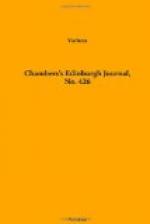’"The total want of fortune,” he said, “and the uncertainty of the morrow, prevented him from marrying her until the destiny of France was determined; but he only awaited the moment when the Revolution should be concluded, in order to retire from the turmoil and strife, marry her whom he loved, go to reside with her in Artois, on one of the farms he had saved among the possessions of his family, and there to mingle his obscure happiness in the common lot of his family.”
’The vicissitudes of the fortune, influence, and popularity of Robespierre effected no change in his simple mode of living. The multitude came to implore favour or life at the door of his house, yet nothing found its way within. The private lodging of Robespierre consisted of a low chamber, constructed in the form of a garret, above some cart-sheds, with the window opening upon the roof. It afforded no other prospect than the interior of a small court, resembling a wood-store, where the sounds of the workmen’s hammers and saws constantly resounded, and which was continually traversed by Madame Duplay and her daughters, who there performed all their household duties. This chamber was also separated from that of the landlord by a small room common to the family and himself. On the other side were two rooms, likewise attics, which were inhabited, one by the son of the master of the house, the other by Simon Duplay, Robespierre’s secretary, and the nephew of his host.
’The chamber of the deputy contained only a wooden bedstead, covered with blue damask ornamented with white flowers, a table, and four straw-bottomed chairs. This apartment served him at once for a study and dormitory. His papers, his reports, the manuscripts of his discourses, written by himself in a regular but laboured hand, and with many marks of erasure, were placed carefully on deal-shelves against the wall. A few chosen books were also ranged thereon. A volume of Jean Jacques Rousseau or of Racine was generally open upon his table, and attested his philosophical and literary predilections.’




